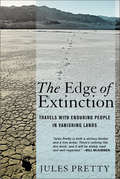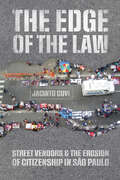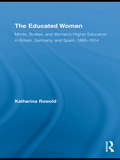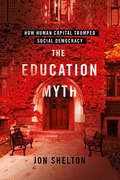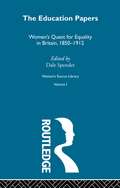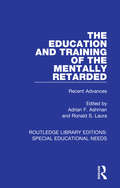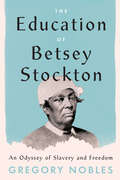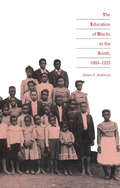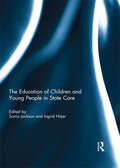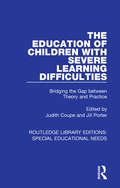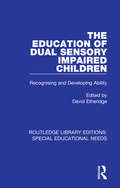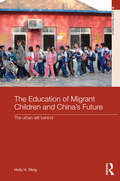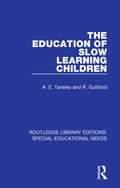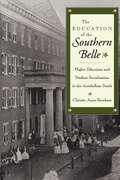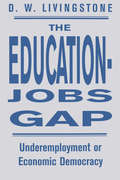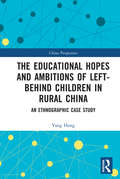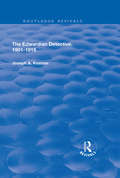- Table View
- List View
The Edge of Extinction: Travels with Enduring People in Vanishing Lands
by Jules PrettyIn The Edge of Extinction, Jules Pretty explores life and change in a dozen environments and cultures across the world, taking us on a series of remarkable journeys through deserts, coasts, mountains, steppes, snowscapes, marshes, and farms to show that there are many different ways to live in cooperation with nature. From these accounts of people living close to the land and close to the edge emerge a larger story about sustainability and the future of the planet. Pretty addresses not only current threats to natural and cultural diversity but also the unsustainability of modern lifestyles typical of industrialized countries. In a very real sense, Pretty discovers, what we manage to preserve now may well save us later. Jules Pretty's travels take him among the Maori people along the coasts of the Pacific, into the mountains of China, and across petroglyph-rich deserts of Australia. He treks with nomads over the continent-wide steppes of Tuva in southern Siberia, walks and boats in the wildlife-rich inland swamps of southern Africa, and experiences the Arctic with ice fishermen in Finland. He explores the coasts and inland marshes of eastern England and Northern Ireland and accompanies Innu people across the taiga’s snowy forests and the lakes of the Labrador interior. Pretty concludes his global journey immersed in the discrete cultures and landscapes embedded within the American landscape: the small farms of the Amish, the swamps of the Cajuns in the deep South, and the deserts of California. The diverse people Pretty meets in The Edge of Extinction display deep pride in their relationships with the land and are only willing to join with the modern world on their own terms. By the examples they set, they offer valuable lessons for anyone seeking to find harmony in a world cracking under the pressures of apparently insatiable consumption patterns of the affluent.
The Edge of Islam: Power, Personhood, and Ethnoreligious Boundaries on the Kenya Coast
by Janet McintoshIn this theoretically rich exploration of ethnic and religious tensions, Janet McIntosh demonstrates how the relationship between two ethnic groups in the bustling Kenyan town of Malindi is reflected in and shaped by the different ways the two groups relate to Islam. While Swahili and Giriama peoples are historically interdependent, today Giriama find themselves literally and metaphorically on the margins, peering in at a Swahili life of greater social and economic privilege. Giriama are frustrated to find their ethnic identity disparaged and their versions of Islam sometimes rejected by Swahili. The Edge of Islam explores themes as wide-ranging as spirit possession, divination, healing rituals, madness, symbolic pollution, ideologies of money, linguistic code-switching, and syncretism and its alternatives. McIntosh shows how the differing versions of Islam practiced by Swahili and Giriama, and their differing understandings of personhood, have figured in the growing divisions between the two groups. Her ethnographic analysis helps to explain why Giriama view Islam, a supposedly universal religion, as belonging more deeply to certain ethnic groups than to others; why Giriama use Islam in their rituals despite the fact that so many do not consider the religion their own; and how Giriama appropriations of Islam subtly reinforce a distance between the religion and themselves. The Edge of Islam advances understanding of ethnic essentialism, religious plurality, spirit possession, local conceptions of personhood, and the many meanings of "Islam" across cultures.
The Edge of the Law: Street Vendors and the Erosion of Citizenship in São Paulo
by Jacinto CuviHow street vendors tangle with the law in São Paulo, Brazil. The daily delights and conveniences that any city dweller has become accustomed to, such as cold water bottles on a summer afternoon in the park or a popsicle from a tray while you’re sitting in traffic, do not come cheap for those offering them. With a little initiative and very little startup money, an enterprising individual might sell you any of these things. Such vendors form a significant share of the workforce in São Paulo, Brazil. Some have the right to practice their trade; others do not. In The Edge of the Law, sociologist Jacinto Cuvi introduces us to this world of street vendors to tease out the relationship between constructions of legality and the experience of citizenship. As the government undertakes a large-scale plan to cancel street vending licenses and evict street vendors, Cuvi reveals how the rights of informal workers can be revoked or withheld, and how the lines can be redrawn between those whose work is “legal” and those who work running from the police. Alongside the mechanics of disenfranchisement, Cuvi captures the lived experience of criminalization, dissecting the distribution of (shallow) rights among these vendors as they continually reinvent strategies to etch out a living while dealing with the constraints and pressures of “informal citizenship” at the edge of the law.
The Edge: The War against Cheating and Corruption in the Cutthroat World of Elite Sports
by Simon Kuper Roger PielkeRoger Pielke reveals how sports stars break the rules in their search for a competitive edge.Both entertaining and thought-provoking, THE EDGE not only visits the battlefields in the war against cheating and corruption, but also explores ways to ensure that "the spirit of sport" can survive in today's high-tech, highly professional world.Drawing on controversies straight out of the headlines, Pielke looks at doping, match fixing, fake amateurism, and other ways of breaking the rules. But are those rules--and the values they reflect--hopelessly outdated?Wonderfully readable and scrupulously researched, THE EDGE blends science and journalism to produce an unforgettable account of sport in crisis.
The Edible City: Toronto's Food From Farm To Fork (uTOpia)
by Nicole Brossard Susanne De LotbiniIf a city is its people, and its people are what they eat, then shouldn't food play a larger role in our dialogue about how and where we live? The food of a metropolis is essential to its character. Native plants, proximity to farmland, the locations of supermarkets, immigration, the role chefs can and should play in society - how a city nourishes itself makes a statement about the kind of city it is.With a cornucopia of essays on comestibles, The Edible City considers how one city eats. It includes dishes on peaches and poverty, on processing plants and public gardens, on rats and bees and bad restaurant service, on schnitzel and school lunches. There are incisive studies of food-security policy, of feeding the needy and of waste, and a happy tale about a hardy fig tree.Together they form a saucy picture of how Toronto - and, by extension, every city - sustains itself, from growing basil on balconies to four-star restaurants. Dig into The Edible City and get the whole story, from field to fork.
The Educated Woman: Minds, Bodies, and Women's Higher Education in Britain, Germany, and Spain, 1865-1914 (Routledge Research in Gender and History)
by Katharina RowoldThe Educated Woman is a comparative study of the ideas on female nature that informed debates on women’s higher education in the late nineteenth and early twentieth centuries in three western European countries. Exploring the multi-layered roles of science and medicine in constructions of sexual difference in these debates, the book also pays attention to the variety of ways in which contemporary feminists negotiated and reconstituted conceptions of the female mind and its relationship to the body. While recognising similarities, Rowold shows how in each country the higher education debates and the underlying conceptions of women’s nature were shaped by distinct historical contexts.
The Education Myth: How Human Capital Trumped Social Democracy (Histories of American Education)
by Jon SheltonThe Education Myth questions the idea that education represents the best, if not the only, way for Americans to access economic opportunity. As Jon Shelton shows, linking education to economic well-being was not politically inevitable. In the eighteenth and nineteenth centuries, for instance, public education was championed as a way to help citizens learn how to participate in a democracy. By the 1930s, public education, along with union rights and social security, formed an important component of a broad-based fight for social democracy.Shelton demonstrates that beginning in the 1960s, the political power of the education myth choked off powerful social democratic alternatives like A. Philip Randolph and Bayard Rustin's Freedom Budget. The nation's political center was bereft of any realistic ideas to guarantee economic security and social dignity for the majority of Americans, particularly those without college degrees. Embraced first by Democrats like Lyndon Johnson, Jimmy Carter, and Bill Clinton, Republicans like George W. Bush also pushed the education myth. The result, over the past four decades, has been the emergence of a deeply inequitable economy and a drastically divided political system.
The Education Papers (Women's Source Library #Vol. 1)
by Dale SpenderFirst published in 1987, this volume makes available key documents, giving the contemporary reader a valuble record of women's struggle for eduacation in the nineteenth and early twentieth centuries. All of the women in this collection achieved significant reforms or struggled to change popular prejudices about women's education
The Education and Training of the Mentally Retarded: Recent Advances (Routledge Library Editions: Special Educational Needs #1)
by Adrian F. Ashman, Ronald S. LauraFirst published in 1985. The field of mental handicap is a broad one encompassing the interests of many professional groups. As a result, there is a need periodically to present wide-ranging reviews of advances in the field. This is the central aim of this volume. Two chapters focus on the cognitive domain, and are especially pertinent in view of the recent release of the new Kaufman Assessment Battery for Children which uses Das’s theoretical position as its foundation. Another contribution reviews the area of non-speech communication with those with special needs, a subject of much current interest and controversy. Other chapters focus on major issues such as maladaptive behaviour and deinstitionalization and use of new technology. The book is thus likely to be relevant to all those with an interest in advances in mental handicap research.
The Education of Betsey Stockton: An Odyssey of Slavery and Freedom
by Gregory NoblesA perceptive and inspiring biography of an extraordinary woman born into slavery who, through grit and determination, became a historic social and educational leader. The life of Betsey Stockton (ca. 1798–1865) is a remarkable story of a Black woman’s journey from slavery to emancipation, from antebellum New Jersey to the Hawai‘ian Islands, and from her own self-education to a lifetime of teaching others—all told against the backdrop of the early United States’ pervasive racism. It’s a compelling chronicle of a critical time in American history and a testament to the courage and commitment of a woman whose persistence grew into a potent form of resistance. When Betsey Stockton was a child, she was “given, as a slave” to the household of Rev. Ashbel Green, a prominent pastor and later the president of what is now Princeton University. Although she never went to school, she devoured the books in Green’s library. After being emancipated, she used that education to benefit other people of color, first in Hawai‘i as a missionary, then Philadelphia, and, for the last three decades of her life, Princeton—a college town with a genteel veneer that never fully hid its racial hostility. Betsey Stockton became a revered figure in Princeton’s sizeable Black population, a founder of religious and educational institutions, and a leader engaged in the day-to-day business of building communities. In this first book-length telling of Betsey Stockton’s story, Gregory Nobles illuminates both a woman and her world, following her around the globe, and showing how a determined individual could challenge her society’s racial obstacles from the ground up. It’s at once a revealing lesson on the struggles of Stockton’s times and a fresh inspiration for our own.
The Education of Blacks in the South, 1860-1935
by James D. Andersoninterpretation of "the history of southern black education from Reconstruction to the Great Depression.
The Education of Blacks in the South, 1860-1935
by James D. AndersonJames Anderson critically reinterprets the history of southern black education from Reconstruction to the Great Depression. By placing black schooling within a political, cultural, and economic context, he offers fresh insights into black commitment to education, the peculiar significance of Tuskegee Institute, and the conflicting goals of various philanthropic groups, among other matters. Initially, ex-slaves attempted to create an educational system that would support and extend their emancipation, but their children were pushed into a system of industrial education that presupposed black political and economic subordination. This conception of education and social order--supported by northern industrial philanthropists, some black educators, and most southern school officials--conflicted with the aspirations of ex-slaves and their descendants, resulting at the turn of the century in a bitter national debate over the purposes of black education. Because blacks lacked economic and political power, white elites were able to control the structure and content of black elementary, secondary, normal, and college education during the first third of the twentieth century. Nonetheless, blacks persisted in their struggle to develop an educational system in accordance with their own needs and desires.
The Education of Children and Young People in State Care
by Sonia Jackson and Ingrid HöjerYoung people who leave care with few or no educational qualifications are at very high risk of social exclusion in adulthood. Yet in the past their education has attracted little attention from researchers or professionals. Studies by the editors and contributors to this volume show that the educational standards attained by young people in care fall progressively behind those of their peers living with their own families. This research-based book looks at the educational experiences of children and youths in nine different European countries and Canada. It identifies the obstacles that prevent them from realising their aspirations and discusses ways of improving their opportunities. How can countries with different traditions, welfare regimes and administrative systems learn from each other? What needs to be done at national, local and individual levels to give children in care equal chances with those living with their families? At present a child in public care is five times less likely to go to university than others. How can teachers, social workers and carers better support their educational attainment, and enable more of them to succeed and progress to tertiary education? This book was originally published as a special issue of the European Journal of Social Work.
The Education of Children with Severe Learning Difficulties: Bridging the Gap between Theory and Practice (Routledge Library Editions: Special Educational Needs #11)
by Judith Coupe and Jill PorterFirst published in 1986. Aimed at teachers, students and related professions this book serves to bridge the gap between the theory and practice of educating pupils with severe learning difficulties. In the light of the 1981 Education Act it is crucial to identify, and subsequently meet, the needs of these pupils. This can only be done by an in-depth understanding of curriculum design, child development and the learning process. This book incorporates these aspects together with an appreciation of teaching techniques and school and classroom organisation. It explains how the parents, school staff and linked agencies complement this procedure.
The Education of Clarence Three Stars: A Lakota American Life
by Philip BurnhamIn The Education of Clarence Three Stars Philip Burnham tells the life story of the remarkable Packs the Dog, a member of the Minneconjou Lakotas who was born in 1864 east of the Black Hills. His father, Yellow Knife, died when the boy was five, and the family eventually enrolled at Pine Ridge Agency with the Oglalas under an uncle&’s name, Three Stars. In 1879 Packs the Dog joined the first class of Indian students to be admitted to the Carlisle Indian Industrial School. An enthusiastic student, Clarence Three Stars, as he would come to be known, was one of five Lakota children who volunteered to stay at Carlisle after the three-year plan of instruction was finished—though he eventually left the school in frustration. Three Stars returned to Pine Ridge and married Jennie Dubray, another Carlisle veteran, and they had seven children. The life of Lakota advocate Three Stars spanned a time of dramatic change for Native Americans, from the pre-reservation period through the Dawes Act of 1887 until just before the Indian Reorganization Act of 1934. Three Stars was a teacher, interpreter, catechist, lawyer, and politician who lived through the federal policy of American Indian assimilation in its many guises, including boarding school education, religious conversion, land allotment, and political reorganization. He used the fundamentals of his own boarding school education to advance the welfare of the Oglala Lakota people, even when his efforts were deemed threatening or subversive. His dedication to justice, learning, and self-governance informed a distinguished career of classroom excellence and political advocacy on his home reservation of Pine Ridge.
The Education of Dual Sensory Impaired Children: Recognising and Developing Ability (Routledge Library Editions: Special Educational Needs #17)
by David EtheridgeThis book, originally published in 1995, is about ability, not disability. It is about what children can do and how they can progress. All children have the moral, ethical and legal right to be educated, no matter what barriers society puts in their way because of their physical disabilities. Dual sensory impaired children, like all others, have the right under the Education Reform Act, 1988, to a broadly-based and balanced curriculum that is appropriate to their needs since they, like any children, will not develop educationally unless that curriculum is appropriate to their needs. This book aims to show some of the ways in which individual children can demonstrate and develop their individual abilities.
The Education of Henry Adams
by Henry AdamsA scion of the famous Adams family of American statesmen, historian Henry Adams crafted this well-known autobiographical work, which reflects his constant search for order in a world of chaos. He cast himself as a modern everyman, seeking coherence in a fragmented universe and concluding that his education was inadequate for the demands of modern society.<P><P> Pulitzer Prize Winner
The Education of Migrant Children and China's Future: The Urban Left Behind (Routledge Studies in Asia's Transformations)
by Holly H. MingThere are more than 225 million rural-to-urban migrant workers, and some 20 million migrant children in Chinese cities. Because of policies related to the household registration (hukou) system, migrant students are not allowed a public high school education in the cities, so their urban education stops abruptly at the end of middle school. This book investigates the post-middle school education and labor market decisions of migrant students in Beijing and Shanghai, and provides a glimpse into the future of a crucial link in China’s development. The stories of how these migrant students seek upward mobility and urban citizenship also reveal one of the most intricate structural inequalities in China today. Based on quantitative data collected from middle schools in Beijing and Shanghai, and ethnographic data drawing on in-depth interviews with migrant children, their parents, and teachers, this book offers a portrait of the migration and educational experiences and prospects of second generation migrant youth in China today. It explores the urban experience of migrant students, contrasting it with that of local city youngsters, examining the migrant students’ family backgrounds, family dynamics, neighborhood and school experience, and interaction with locals. It goes on to look at the migrant students’ education and career aspirations, the structural obstacles preventing their fulfilment, and how migrant families respond to institutional constraints on educational opportunity. Finally, the book concludes with a discussion of policy implications and offers proposals for resolving the dilemmas of migrant youth. This book will of great interest to students and scholars of Chinese studies, Asian education, migration and social development.
The Education of Slow Learning Children (Routledge Library Editions: Special Educational Needs #53)
by A. E. Tansley R. GullifordOriginally published in 1960. The authors of this text examine ways in which both ordinary schools and special needs schools can further develop suitable education for pupils with special needs, including improved post-school guidance. This title aims to provide a guide to teachers in deciding the aims of their teaching and to assist in the planning of their teaching methods.
The Education of a Black Radical: A Southern Civil Rights Activist's Journey, 1959-1964
by Nikki Giovanni D’Army Bailey"A strong, uncompromising voice that dreams of a better America, Judge Bailey has experienced the ugliness of both racism and fear. Yet he has not stepped back. What a wonderful life to share." -- Nikki Giovanni, from her ForewordWhen four black college students refused to leave the whites-only lunch counter of a Greensboro, North Carolina, Woolworth's on February 1, 1960, they set off a wave of similar protests among black college students across the South. Memphis native D'Army Bailey, the freshman class president at Southern University -- the largest predominantly black college in the nation -- soon joined with his classmates in their own battle against segregation in Baton Rouge, Louisiana. In The Education of a Black Radical, Bailey details his experiences on the front lines of the black student movement of the early 1960s, providing a rare firsthand account of the early days of America's civil rights struggle and a shining example of one man's struggle to uphold the courageous principles of liberty, justice, and equality.A natural leader, Bailey delivered fiery speeches at civil rights rallies, railed against school officials' capitulation to segregation, joined a sit-in at the Greyhound bus station, and picketed against discriminatory hiring practices at numerous Baton Rouge businesses. On December 15, 1961, he marched at the head of two thousand Southern University students seven miles from campus to downtown Baton Rouge to support fellow students jailed for picketing. Baton Rouge police dispersed the peaceful crowd with dogs and tear gas and arrested many participants. After Bailey led a class boycott to protest the administration's efforts to quell the lingering unrest on campus, Southern University summarily expelled him.After his ejection, Bailey continued his academic journey north to Clark University in Worcester, Massachusetts, where liberal white students had established a scholarship for civil rights activists. Bailey sustained and expanded his activism in the North, and he provides invaluable eyewitness accounts of many major events from the civil rights era, including the protests in Washington D.C.'s financial district during the summer of 1963 and the gripping violence and arrests in Baltimore later that year. He sheds new light on the 1963 March on Washington by exploring the political forces that seized the march and changed its direction.Labeled "subversive" and a "black nationalist militant" by the FBI, Bailey crossed paths with many visionary activists. In riveting detail, Bailey recalls several days he spent hosting Malcolm X as a guest speaker at Clark, hanging out with Abbie Hoffman in the early days of the Worsester Student Movement, and personal interactions with other civil rights icons, including the Reverend Will D. Campbell, Anne Braden, James Meredith, Tom Hayden, and future congressmen Barney Frank, John Lewis, and Allard Lowenstein. D'Army Bailey gives voice to a generation of student foot soldiers in the civil rights movement. Moving, powerful, and intensely personal, The Education of a Black Radical offers an inspirational tale of hope and a courageous stand for social change. Moreover, it introduces an invigorating role model for a new generation of activists taking up the racial challenges of the twenty-first century.
The Education of the Southern Belle: Higher Education and Student Socialization in the Antebellum South
by Christie Anne FarnhamThe American South before the Civil War was the site of an unprecedented social experiment in women's education. The South offered women an education explicitly designed to be equivalent to that of men, while maintaining and nurturing the gender conventions epitomized by the ideal of the Southern belle. This groundbreaking work provides us with an intimate picture of the entire social experience of antebellum women's colleges and seminaries in the South, analyzing the impact of these colleges upon the cultural construction of femininity among white Southern women, and their legacy for higher education. Christie Farnham investigates the contradiction involved in using a male-defined curricula to educate females, and explores how educators denied these incongruities. She also examines the impact of slavery on faculty and students. The emotional life of students is revealed through correspondence, journals, and scrapbooks, highlighting the role of sororities and romantic friendships among female pupils. Farnham ends with an analysis of how the end of the Civil War resulted in a failure to keep up with the advances that had been achieved in women's education. The most comprehensive history of this brief and unique period of reform to date, The Education of the Southern Belle is must reading for anyone interested in women's studies, Southern history, the history of American education, and female friendship.
The Education-Jobs Gap: Underemployment Or Economic Democracy?
by D W LivingstoneAccording to Ivar Berg's performance criteria, over half of the U.S. workforce is now underemployed. Using analysis based on U.S. and Canadian surveys of work and learning experiences and other documental data, author David Livingstone exposes the myth of the "learning enterprise" and argues that the major problem in education-work relations is not education but the mismatch between work and worker.
The Educational Hopes and Ambitions of Left-Behind Children in Rural China: An Ethnographic Case Study (China Perspectives)
by Yang HongThis monograph highlights the educational experiences of rural children who are 'left behind' by their migrant worker parents in China, analyzing how this situation impacts on their aspirations and self-identity. Via an ethnographic and qualitative case study of a rural school in southwest China, the author presents the real lives of these disadvantaged children along with their challenges and needs, and provides an in depth understanding of how being ‘left behind’ impacts on their future aspirations. Building on the sociological theories of Pierre Bourdieu, the author makes an original contribution by combining seemingly incompatible disciplinary perspectives, such as cultural capital from sociology, rational action from behavioral economics, and self-efficacy from psychology. Hence, the book endeavors to transfer these Western theories to an Eastern context and demonstrates cultural nuances that are not always captured when applied in the West. The book will attract academic scholars and postgraduate students in the area of socially disadvantaged children and young people as well as those who are working on youth studies and rural education.
The Educational Philosophy of Mahatma Gandhi
by M. S. Patel“By education, I mean an all-round drawing out of the best in child and man—body, mind and spirit. Literacy is not the end of education nor even the beginning. It is one of the means whereby man and woman can be educated. Literacy in itself is no education.” … “the aim of education should be to develop to the full the potentialities of every child at school, in accord always with the general good of the community of which he is a member.” M. K. Gandhi
The Edwardian Detective: 1901-15 (Routledge Revivals)
by Professor Joseph KestnerThis title was first published in 1999 & examines the range of detective literature produced between 1901 and 1915 in Britain, during the reign of Edward VII and the early reign of George V. The book assesses the literature as cultural history, with a focus on issues such as legal reform, marital reform, surveillance, Germanophobia, masculinity/femininity, the "best-seller", the arms race, international diplomacy and the concept of "popular" literature. The work also addresses specific issues related to the relationship of law to literature, such as: the law in literature; the law as literature, the role of literature in surveillance and policing; the interpretation of legal issues by literature; the degree to which literature describes and interprets law; the description of legal processes in detective literature; and the connections between detective literature and cultural practices and transitions.
